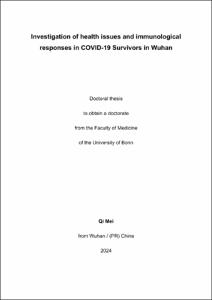Investigation of health issues and immunological responses in COVID-19 Survivors in Wuhan

Investigation of health issues and immunological responses in COVID-19 Survivors in Wuhan

| dc.contributor.advisor | Kurts, Christian | |
| dc.contributor.author | Mei, Qi | |
| dc.date.accessioned | 2024-03-12T14:45:40Z | |
| dc.date.available | 2024-03-12T14:45:40Z | |
| dc.date.issued | 12.03.2024 | |
| dc.identifier.uri | https://hdl.handle.net/20.500.11811/11421 | |
| dc.description.abstract | To the present, several studies have investigated the sequelae and herd immunity of discharged and recovered coronavirus infectious disease-2019 (COVID-19) patients. However, little is known whether the life quality and safety of these COVID-19 survivors may be influenced by prior COVID- 19 infection. To clarify this issue, the present study recruited a total of 3,677 discharged COVID- 19 patients [median age = 59 years, interquartile range (IQR) = 47–68, range = 10–98; 55.5 % female], who hospitalized in four medical facilities or hospitals in Wuhan, China in the time interval between January 18 and March 29, 2020. Three forms of data including case reports, medical records, and self-reports were included into the present study. All participants were followed to record possible post-COVID-19 sequelae, with a median of 144 days (IQR = 135– 157). During this follow-up, approximately a quartal patients (976; 26.5 %) experienced at least one post- COVID-19 sequela. The incidence of post-COVID-19 sequelae of elderly COVID-19 survivors (=60 years) was moderately higher than that of young COVID-19 survivors (<60 years; relative risk [RR] 1.05, 95 % CI 1.02–1.10, p = .007). Colloidal gold-based immunochromatographic strip assay (ICGSA) was used to measure the titer of anti-SARS-CoV-2 immunoglobulin G (IgG) and immunoglobulin M (IgM) antibody testing. We observed a dramatic reduction of anti-SARS-CoV-2 IgG (88.0 %, 95 % CI = 84.2–90.4) and IgM (93.2 %, 95 % CI = 88.5–96.4) antibodies during this follow-up. We used Real-time quantitative PCR (RT-qPCR) for the detection of the presence of severe acute respiratory syndrome-related coronavirus 2 (SARS-CoV-2) detection. In this cohort, we found that 45 (1.2 %) patients were retested positive for SARS-CoV-2 and 37 (1.0 %) patients died during follow-up. Of those who died during this follow-up study, 26 (70.3 %) patients were male and all patients were tested negative for both IgG and IgM, except for one-person retested IgG-positive. The present study documents the presence of post-COVID-19 sequelae that impair functions of multiple organ systems among COVID-19 survivors. This result suggests that the long-term effects of COVID-19 infection have increasing impact by negatively influencing survivors’ quality of life, straining health care systems, and resulting in extended periods of lost productivity. | en |
| dc.language.iso | eng | |
| dc.rights | In Copyright | |
| dc.rights.uri | http://rightsstatements.org/vocab/InC/1.0/ | |
| dc.subject.ddc | 610 Medizin, Gesundheit | |
| dc.title | Investigation of health issues and immunological responses in COVID-19 Survivors in Wuhan | |
| dc.type | Dissertation oder Habilitation | |
| dc.publisher.name | Universitäts- und Landesbibliothek Bonn | |
| dc.publisher.location | Bonn | |
| dc.rights.accessRights | openAccess | |
| dc.identifier.urn | https://nbn-resolving.org/urn:nbn:de:hbz:5-75523 | |
| dc.relation.doi | https://doi.org/10.3389/fmed.2021.617689 | |
| ulbbn.pubtype | Erstveröffentlichung | |
| ulbbnediss.affiliation.name | Rheinische Friedrich-Wilhelms-Universität Bonn | |
| ulbbnediss.affiliation.location | Bonn | |
| ulbbnediss.thesis.level | Dissertation | |
| ulbbnediss.dissID | 7552 | |
| ulbbnediss.date.accepted | 13.02.2024 | |
| ulbbnediss.institute | Medizinische Fakultät / Institute : Institut für Experimentelle Immunologie (IEI) | |
| ulbbnediss.fakultaet | Medizinische Fakultät | |
| dc.contributor.coReferee | Bartok, Eva |
Files in this item
This item appears in the following Collection(s)
-
E-Dissertationen (2059)




